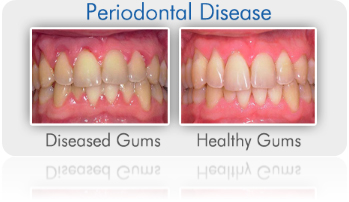Periodontal disease affects the gums, bone and other supporting tissues of the teeth. Although most individuals suffer gum inflammation from time to time, around 10% of the population appear to suffer from the more severe forms of the disease which cause loss of supporting bone. This group appears to be at greatest risk of losing teeth through periodontal disease. It is caused by the bacteria which regularly collect on the teeth.

Why do some people suffer from this problem and others not
Around 10% of the population is susceptible. Our knowledge is improving all the time of why this is, although 3 major factors are thought to be responsible. Family history, stress and smoking are all important risk factors. Stopping smoking is an important part of reducing the risk of developing the disease. Certain general diseases such as diabetes may also make an individual more susceptible.
How do I know that I have got gum disease?
The signs and symptoms of periodontal disease vary significantly but may include gums that bleed when brushing, together with signs of more advanced disease such as movement or drifting of the teeth. However, it is possible to have the disease and not be aware of these signs. It is essential to see your dentist regularly so that special assessment techniques, sometimes including x-rays, can be carried out as part of your routine dental examinations.
What should I do when I am made aware that I have got gum disease?
Regular examinations by your dentist will ensure that the right diagnosis is made. Your dentist will be able to advise you about any necessary treatment. This will often include specific oral hygiene methods to help you control the bacteria that collect on your teeth. There may also be a need to carry out some professional cleaning of your teeth. Most cases of periodontal disease can be successfully treated by your dentist using methods such as these. When complex treatments are required, your dentist will advise you accordingly.
What are the consequences of periodontal disease?
Periodontitis is the leading cause of tooth loss.
If the progress of periodontal inflammation is not halted, the supporting structures of the teeth, including the surrounding bone, are destroyed. The teeth eventually loosen and are lost, or require extraction. Other problems patients may experience include painful abscesses, drifting of the teeth which may interfere with eating, and unsightly lengthening of the teeth with exposure of the roots, as a result of gum recession.
It is now understood that untreated periodontal disease can have effects on general health; for example, it poses an increased risk for complications during pregnancy and also an increased risk for heart disease and diabetes.
What are the risk factors for periodontitis?
There are a number of factors that increase your chance of developing periodontitis and make it more likely to progress. Well-known risk factors include stress, some systemic diseases such as diabetes, and – most importantly - smoking.
Smoking and periodontitis
• Smokers are significantly more likely to develop periodontitis than non-smokers.
• Periodontal treatments (such as gum/ bone grafts and implants) are less successful in smokers than non-smokers due to poorer healing.
• Periodontitis progresses much faster, with more rapid tooth loss, in smokers.
• Of cases of periodontitis which does not respond to treatment, about 90% are in smokers.
Whom should I ask to get more information?
Please book an appointment with us and we will be happy to answer all you queries and questions. Dr Romeed is a specialist periodontist and his name appears on General Dental Council's website for specialists. Dr Romeed will be able to address your problems after having a consultation with him.